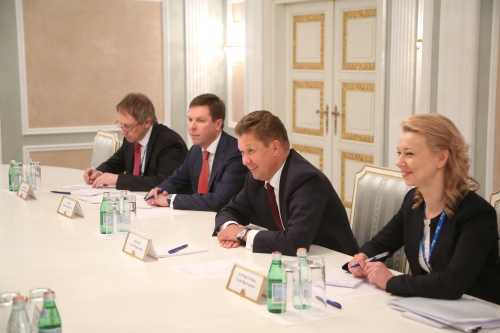Baku's Balancing Act
Azerbaijan's state monopoly Socar is once again performing its delicate balancing act between long-term gas export deliveries and near-term import requirements; between western markets and Russian imports. Its president Rovnag Abdullaev visited Gazprom, having previously said Socar was interested in importing between 3 and 5bn m³/yr from Russia.
On the same day, June 14, that Socar said that Abdullaev's visit to attend the St. Petersburg International Economic Forum would include talks with Gazprom, it was also disclosed that the Asian Development Bank was ready to allocate close to $2bn for the giant Shah Deniz Phase 2 (SD2) gas export project, and that the World Bank was signalling its readiness to help finance the Tanap pipeline across Turkey that would carry SD2 gas to market.

Alexey Miller at the St. Petersburg International Economic Forum 2016 (image: Gazprom)
It's a curious position that Azerbaijan finds itself in. Its medium-term prospects for gas exports are good, with SD2 gas expected to reach Turkey in 2018 and Bulgaria, Greece, Albania and, above all, Italy, at the start of 2020.
But it does face both short-term problems concerning gas needed to feed the domestic market and long-term problems concerning what happens after the SD2 project comes on line. The core of the problem is that all the gas from SD2 is earmarked for export, notably 6bn m³/yr for Turkey and 10bn m³/yr for European countries beyond Turkey. But it is suffering from reduced production from other fields, and this is impacting on its domestic supplies and also on its ability to use gas from other sources to supply Georgia.
Gazprom had been anticipating these talks for some time. Two weeks ago Gazprom's deputy chairman Alexander Medvedev, said the matter would be raised at St Petersburg as "we can see... that Azerbaijan needs to buy Russian gas."
On the upstream front, the ADB's representative in Baku has said that as well as discussing $450mn in support of private sector investment in SD2 (which, as NGE has previously reported, is earmarked for Socar), it is looking to help arrange some $1.505bn for the Azerbaijani government in connection with its SD2 investment plan. An ADB mission will visit Baku late in June to consider how best to support the investment plan, with the bank's representative in Azerbaijan, Nariman Mannapbekov, saying that two ways of financing the project are under consideration. These are, Mannapbekov said, "giving a credit or credit guarantees (first option), or giving both a credit and guarantees (the second option)."
For its part, the World Bank has said it is considering how best to support Azerbaijan's financing of Tanap.
Larisa Leshchenko, head of the WB Baku office, told Azerbaijan's Trend news agency, in an interview published June 16, that the World Bank group was also considering both direct loans and loan guarantees. She said bank support could take the form of direct financing from the World Bank itself and/or loan guarantees from its affiliate, the Multilateral Investment Guarantee Agency. The World Bank is also engaged in talks with Botas on financing Tanap. Azerbaijan's Socar has a 58% stake; Turkish Botas a 30% stake; and UK major BP holds the remaining 12%.
Such financing is vital, given the enormous costs of developing SD2 and the associated Tanap and TAP projects, which collectively form the Southern Gas Corridor (SGC) project. The collection of SGC projects was originally costed at around $45bn, but as Azerbaijan's energy minister Natiq Aliev disclosed recently, these costs have come down significantly. Addressing the recent Caspian Oil and Gas Conference, he put the revised costs for SD2 at $23.8bn; the cost of constructing the 1,850-km Tanap line across Turkey at $9.3bn; and the cost of the 870-km TAP line from the Turkish-Greek border to southern Italy at $6bn.
Significantly, Aliev also gave a breakdown for the SD2 expansion, saying this included $4.9bn for the South Caucasus Pipeline from Baku to the Georgian border with Turkey, a project which is being handled by the Shah Deniz consortium. Aliev thus indicated that the cost of developing the offshore field to produce 16bn m³/yr, and the onshore facilities at the Sangachal terminal to handle this, was currently estimated at $18.9bn.
The shortage of domestic gas has already prompted Socar to announce the postponement of its planned $12bn Oil and Gas Processing & Petrochemical Complex (OGPC). But Socar has clearly not abandoned the project. On June 2, Abdullaev said that in talks with the China National Petroleum Corporation he had raised the possibility of CNPC either becoming a partner in the project or investing in it. [Since the time of writing, Socar, and the Russian agency for export credit and investment insurance (Exiar), Gazprombank and Italian export credit agency Sace signed an agreement to develop OGPC, on June 17. Gazprombank values the initial investment is $3.5bn – Editor.]
In the long run, Azerbaijan has extensive offshore resources that will enable it to considerably expand its exports whilst also feeding such projects as the OGPC. But there is an issue of timing as there is a lack of rigs available for the projects required to develop these resources. Matters should become clearer in November, when France's Total has said it will unveil more detailed plans for the Absheron field, which is widely expected to be the next major offshore development after SD2.
Meanwhile, it's not only in gas that Azerbaijan is seeing an improvement in its energy relations with Russia. Oil exports via the Baku-Novorossiysk pipeline are steadily increasing. They totalled just 932,000 metric tons (mt) in 2014 but rose to 1.27mn mt in 2015. And, in the last quarter of this year, they are slated to hit 420,000 mt under a new agreement with Russia's Transneft.
John Roberts, Chief Analyst


